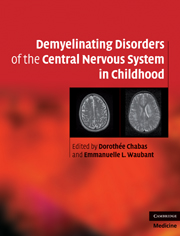Book contents
- Demyelinating Disorders of the Central Nervous System in Childhood
- Demyelinating Disorders of the Central Nervous System in Childhood
- Copyright page
- Contents
- Contributors
- Abbreviations
- Preface
- Chapter 1 Introduction: historical perspective of pediatric multiple sclerosis and related disorders
- Chapter 2 Controversies around the current operational definitions of pediatric MS, ADEM, and related diseases
- Section 1 Pediatric MS Diagnosis
- Section 2 Pediatric MS Course and Treatment
- Section 3 Pediatric MS Biology
- Section 4 ADEM
- Section 5 Optic Neuritis in Children
- Chapter 20 Pediatric optic neuritis
- Chapter 21 Recurrent isolated optic neuritis in the pediatric population
- Section 6 Acute Complete Transverse Myelitis in Children
- Section 7 Neuromyelitis in Children
- Index
Chapter 21 - Recurrent isolated optic neuritis in the pediatric population
from Section 5 - Optic Neuritis in Children
Published online by Cambridge University Press: 11 April 2011
- Demyelinating Disorders of the Central Nervous System in Childhood
- Demyelinating Disorders of the Central Nervous System in Childhood
- Copyright page
- Contents
- Contributors
- Abbreviations
- Preface
- Chapter 1 Introduction: historical perspective of pediatric multiple sclerosis and related disorders
- Chapter 2 Controversies around the current operational definitions of pediatric MS, ADEM, and related diseases
- Section 1 Pediatric MS Diagnosis
- Section 2 Pediatric MS Course and Treatment
- Section 3 Pediatric MS Biology
- Section 4 ADEM
- Section 5 Optic Neuritis in Children
- Chapter 20 Pediatric optic neuritis
- Chapter 21 Recurrent isolated optic neuritis in the pediatric population
- Section 6 Acute Complete Transverse Myelitis in Children
- Section 7 Neuromyelitis in Children
- Index
Summary
Keywords
- Type
- Chapter
- Information
- Publisher: Cambridge University PressPrint publication year: 2011

